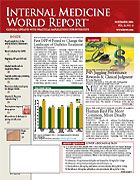Coffee and MI: The Risks Are Greater Than You Think
Genetics Could Be the Deciding Factor
Epidemiology
Drinking a cup of coffee may cause a heart attack in some people within 1 hour, according to a study published in (2006; 17:506-511). The risk was highest when occasional coffee drinking was combined with a sedentary lifestyle or other risk factors for heart disease.
The study included 503 Costa Ricans who had a nonfatal myocardial infarction (MI) between 1994 and 1998. In addition to other factors, patients were asked about their coffee consumption in the hours and days before their MI.
Coffee drinking was classified as:
Occasional: ≤1 cup/day (n = 103)
Moderate: 2-3 cups/day (n = 280)
Heavy: ≥4 cups/day (n = 120).
Overall, the relative risk of MI in the hour after coffee consumption was 1.49. Risk in occasional drinkers was 4.14 compared with 1.60 in moderate drinkers and 1.06 in heavy drinkers. The relative risk with ≥3 risk factors was 2.10 compared with 1.39 with <3 risk factors. Sedentary patients had a 1.72 relative risk of MI, compared with 1.07 in nonsedentary patients.
“People at high risk for a heart attack who are occasional or regular coffee drinkers might want to consider quitting coffee altogether,” said lead investigator Ana Baylin, MD, DrPH, of Brown University. She added that for these individuals, a cup of coffee could “be the straw that broke the camel’s back.”
IMWR
Dr Baylin told , “The most important clinical implication of the study is that the effect of coffee as a trigger of MI was high among people who were sedentary and null among physically active people. This finding highlights the importance of focusing on healthy habits to prevent coronary heart disease. This is also consistent with previous studies that explored other triggers of MI, like heavy physical exertion.”
A second study (JAMA. 2006; 295: 1135-1141) showed that individuals with a genetic variation associated with slower caffeine metabolism appear to be at greater risk of nonfatal MI if their coffee consumption is high.
Coffee’s effects on the human body have been studied for years, but results have often conflicted. Despite previously being implicated as a contributor to cardiovascular (CV) disease, the fact that coffee contains chemicals other than caffeine that have variable CV effects has made it difficult to determine whether it is the caffeine alone that is responsible for the increased MI risk.
CYP1A2*1F
CYP1A2*1A
Caffeine is metabolized primarily by the cytochrome (CY) P450 isoenzyme 1A2 (CYP1A2). Patients with the gene variant allele are “slow” caffeine metabolizers; those with the gene variant allele are “rapid” caffeine metabolizers.
This second study (also conducted in Costa Rica) included 2014 case patients with a first nonfatal MI and 2014 controls. Patient genotype and coffee intake were assessed.
Some 55% of the patients with a first MI and 54% of the control group were carriers of the slow allele. The risk of MI was increased by 36% among those who drank 2 to 3 cups/day of coffee and by 64% among those who drank ≥4 cups/day. In patients with the rapid allele, the risk of MI was reduced by 22% and 1%, respectively.
CYP1A2*1F
“We found that increased coffee intake is associated with an increased risk of nonfatal myocardial infarction,” wrote the authors. “The association between coffee and myocardial infarction was found only among individuals with the slow allele, which impairs caffeine metabolism, suggesting that caffeine plays a role in the association.”
But coffee has shown benefits as well. For example, it is the leading source of antioxidants in the American diet, and evidence shows that coffee protects against liver and colon cancer, type 2 diabetes, and Parkinson’s disease.
Clearly, the jury is still out, and more research is needed.
Noting that it can be “hard to give clear and good advice to high-risk patients,” Dr Baylin said, “In theory, anything that can increase their sympathetic activity may trigger an MI, from heavy physical exertion to anger, among others. The relative risks are high, but since the absolute risk of MI per hour is low, the increase in absolute risk will be small. And finally there might be patients who may not be affected by coffee due to genetic background. I think that high-risk patients may consider quitting coffee, but also it is important to realize that there are many other things to keep in mind regarding healthy habits and that are probably more important than coffee intake.”
